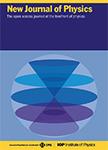版权所有:内蒙古大学图书馆 技术提供:维普资讯• 智图
内蒙古自治区呼和浩特市赛罕区大学西街235号 邮编: 010021

作者机构:Tech Univ Berlin Elect Engn & Comp Sci Dept D-10587 Berlin Germany Deutsch Zent Luft & Raumfahrt eV DLR Inst Opt Sensor Syst D-12489 Berlin Germany Humboldt Univ Dept Phys D-12489 Berlin Germany Ferdinand Braun Inst D-12489 Berlin Germany Fraunhofer Inst Open Commun Syst FOKUS D-10589 Berlin Germany Tech Univ Berlin Inst Opt & Atom Phys D-10623 Berlin Germany
出 版 物:《NEW JOURNAL OF PHYSICS》 (New J. Phys.)
年 卷 期:2024年第26卷第11期
页 面:113021页
核心收录:
基 金:Bundesministerium fr Bildung und Forschunghttp://dx.doi.org/10.13039/501100002347 [QPIC-1, 13N15870, 13N14921] German Federal Ministry of Education and Research (BMBF Project) DLR Quantum Computing Initiative - (Federal Ministry for Economic Affairs and Climate Action) DFG European Research Council (ERC) Hector Fellow Academy Einstein Foundation Berlin (Einstein Research Unit on Quantum Devices)
主 题:linear optical quantum computing quantum simulation experimental imperfections photonic GHZ state
摘 要:While the advantages of photonic quantum computing, including direct compatibility with communication, are apparent, several imperfections such as loss and distinguishability presently limit actual implementations. These imperfections are unlikely to be completely eliminated, and it is therefore beneficial to investigate which of these are the most dominant and what is achievable under their presence. In this work, we provide an in-depth investigation of the influence of photon loss, multi-photon terms and photon distinguishability on the generation of photonic 3-partite Greenberger-Horne-Zeilinger states via established fusion protocols. We simulate the generation process for spontaneous parametric down-conversion and solid-state-based single-photon sources using realistic parameters and show that different types of imperfections are dominant with respect to the fidelity and generation success probability. Our results indicate what are the dominant imperfections for the different photon sources and in which parameter regimes we can hope to implement photonic quantum computing in the near future.